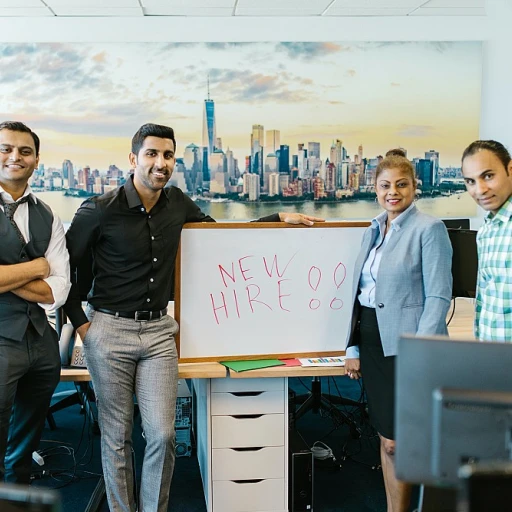
Understanding the Candidate Experience
Defining the Candidate Experience
Creating a positive journey for potential employees begins with understanding what we mean by the candidate experience. It's a comprehensive term that encompasses every interaction an applicant has with a company, from the initial job posting to the final hiring decision. This journey is critical because it not only reflects the company's values but also shapes the perception of potential employees. The candidate experience directly impacts a company's ability to attract and retain top talent. An engaging and smooth process will likely leave candidates feeling respected and valued, regardless of the outcome, while a disorganized or negative experience could deter them from considering the organization in the future. An understanding of this journey is essential, not just for acquiring the best candidates but for maintaining and enhancing a company’s reputation. Given the importance of the candidate experience, it's vital to consider how feedback is gathered and used to refine the hiring process continuously. Building a strong employer brand and streamlining the application process are also key components worth delving into in subsequent discussions. To truly master the art of a great candidate experience, companies must prioritize each interaction with empathy and efficiency. For a more profound insight into enhancing these interactions, visit Mastering the Art of a Great Candidate Experience.The Role of Feedback in the Hiring Process
The Power of Constructive Feedback
In the realm of recruitment, feedback plays a pivotal role. It's not just a formality; it's a lifeline for the candidate's journey. When thoughtfully provided, feedback can turn an average candidate experience into an exceptional one.Unveiling the Benefits of Honest Feedback
The value of honest and timely feedback cannot be overstated. For candidates, constructive insights help them grow, understand their strengths, and identify areas for improvement. It elevates their respect and appreciation for the hiring company, fostering a positive impression even if they weren't selected for the role. From an employer's perspective, delivering feedback can enhance the company's reputation. Candidates who feel heard and valued are more likely to speak positively about their experience, contributing to a stronger employer brand. This is especially important for building trust in competitive job markets.Strategies for Effective Feedback Delivery
While the benefits are clear, providing feedback requires a delicate touch. Ensuring feedback is specific, actionable, and delivered promptly are key elements to consider. Offering examples or suggestions can make the information more useful to the candidate. Moreover, technology can aid in streamlining this process. Utilizing tools or platforms to efficiently manage and track the feedback can simplify the task for recruiters. This is part of a broader effort to create a more efficient and empathetic recruitment process, aligning with the views discussed in building a strong employer brand. For a comprehensive understanding of how to provide feedback effectively, consider exploring mastering the art of a great candidate experience. This resource offers insights into crafting a candidate experience that not only attracts top talent but also maintains their engagement throughout the recruitment process.Building a Strong Employer Brand
The Influence of Employer Branding on a Successful Candidate Experience
A crucial component of creating a successful experience for potential candidates lies in your employer brand. A powerful and well-positioned brand can leave a lasting impression long before a candidate submits an application. Let's delve into how this aspect impacts overall candidate satisfaction and perception. Firstly, a strong employer brand communicates your company values, culture, and mission clearly, attracting candidates whose personal values align with those of your organization. This alignment not only helps in building a cohesive workforce but also enhances the candidate's connection to your company early in the hiring process. As highlighted in the section on understanding the candidate experience, offering candidates an insight into what it's like to be part of your team can foster trust and transparency. Additionally, effective branding acts as a magnet, drawing top talent to your organization, reducing recruitment time, and cutting costs. It signals to the candidates that your company is a desirable place to work, filled with opportunities for professional growth and development. The perception candidates form through employer branding can significantly influence their decision to accept a job offer or continue their search elsewhere. Furthermore, maintaining a strong brand presence throughout your various candidate experience touchpoints ensures that candidates remain engaged and enthusiastic throughout the hiring process. This consistent branding helps reinforce your company image and leaves candidates with a memorable experience, whether they are successful or not. In line with improving your candidate experience, regularly gathering feedback from candidates about their experience with your brand during the hiring process provides invaluable insights. Consider crafting the perfect candidate experience survey questions to assess how candidates perceive your brand and identify areas for improvement. By understanding these perceptions, you can make strategic adjustments to strengthen your employer brand and enhance the overall candidate experience, setting your company apart in the competitive job market.Streamlining the Application Process
Enhancing Efficiency in the Application Journey
The application process is a critical touchpoint in the journey of a candidate. It’s the gateway through which potential employees begin their interaction with your organization. An efficient and streamlined application procedure not only enhances the candidate experience but also serves as a reflection of your company's values and organizational skills. The first step in ensuring a seamless application process is to improve accessibility. This means ensuring that candidates can easily find job openings and submit their applications through a user-friendly interface. Organizations should focus on designing an intuitive careers page, optimizing for mobile responsiveness, and simplifying navigation. A cluttered or confusing job portal can deter qualified candidates, while a clear and well-organized pathway can attract top talent. Another pivotal aspect is minimizing the complexity of application forms. Long, cumbersome forms can be a major deterrent for candidates. By keeping the necessary fields to a minimum and allowing resume parsing technology to fill in details automatically, you can make the process less time-consuming. This not only benefits the candidates by saving them valuable time but also improves your efficiency by reducing data entry errors. Communication is another essential part of the application process. Candidates appreciate timely updates regarding their application status. Automated systems that send notifications at each stage of the recruitment process can keep candidates engaged and informed. This transparency fosters trust and showcases your organization's professionalism. Additionally, integrating applicant tracking systems (ATS) that enable recruiters to manage applications more effectively can greatly enhance the process. These systems help in parsing resumes, filtering candidates based on criteria, and scheduling interviews seamlessly. Investing in the right technology can help HR teams to focus more on building relationships rather than spending excessive time on administrative tasks. Lastly, the feedback loop, as discussed earlier, is indispensable here. Gathering insights from applicants about their experience with the application process can unveil areas of improvement. Leveraging these insights allows organizations to continuously refine and optimize the journey, ensuring that the first impression of your company is an outstanding one. In conclusion, by focusing on accessibility, simplicity, communication, and technology, organizations can craft a welcoming and efficient application process that not only bolsters the candidate’s experience but also enhances the company's overall recruitment outcomes. This strategic approach not only supports the company's reputation but also boosts its ability to attract and retain the best talent in the industry.The Impact of Company Culture on Candidates
The Influence of an Authentic Company Culture
When it comes to creating an inviting environment for potential hires, company culture plays a pivotal role in shaping a positive candidate experience. A genuine, well-defined culture not only attracts top talent but also aligns candidates’ values with the organization’s mission and vision, promoting long-term satisfaction and retention. Remember that a company’s culture is like its fingerprint – unique and recognizable. As explored earlier in our discussion on employer branding, companies with a strong sense of culture tend to foster environments where candidates feel valued and inspired. This initial connection is crucial as it fosters trust and establishes a good rapport with potential hires. Taking inspiration from vibrant company cultures, such as those detailed in our previous insights into feedback and application processes, reveals how crucial it is to communicate your cultural ethos clearly from the outset. It should resonate throughout the candidate’s entire journey, reinforcing the company’s core values and demonstrating a commitment to inclusivity and innovation. Moreover, transparency regarding company culture should extend beyond generic statements on corporate websites. Use interviews not just as a means to evaluate a candidate’s skills but also to showcase what makes your workplace unique. Encourage current employees to share their own testimonials and experiences, giving candidates a glimpse into daily life at the company. This authentic representation can differentiate an organization from other potential employers, often being the deciding factor for a candidate choosing where to take their talents. In essence, fostering an authentic company culture and effectively communicating it throughout the hiring process can profoundly enhance the candidate experience. This strategic alignment offers candidates more than just a job; it offers them a place where they feel like they belong and can thrive, which ultimately benefits both the candidate and the organization.Measuring and Improving Candidate Experience
Assessing the Journey: Key Metrics for Candidate Experience
To ensure that your candidate experience is continuously evolving and improving, it is essential to measure various aspects of it. This requires the identification of key metrics that will provide insights into the effectiveness of your hiring process and highlight areas for improvement.
One crucial metric to consider is the candidate Net Promoter Score (NPS). This score gauges candidates’ likelihood to recommend your company to other job seekers. A high NPS indicates a positive impression, while a low score can signal potential issues in your recruitment process. This metric allows your organization to track its progress over time and measure the impact of any changes implemented.
Time to hire is another important metric to keep an eye on. It reflects the efficiency of your recruitment process and its effect on candidate satisfaction. A lengthy hiring process can result in candidate fatigue or loss of interest, while a swift one may leave a positive mark on the candidate experience. Analyzing the time to hire can help identify bottlenecks in your workflow that, once addressed, could lead to swifter, more satisfying experiences for job seekers.
Feedback from candidates is also invaluable. By actively soliciting and analyzing candidate feedback, you can gain a deeper understanding of their experience. Candidate satisfaction surveys, exit interviews, and even informal conversations can offer direct insights into areas where your process excels or requires refinement. If you are interested in more on the importance of candidate feedback, consider exploring resources like this blog post that delve into its role in the recruitment process.
Lastly, candidate acceptance rates serve as a bellwether for the attractiveness of your offer and the appeal of your employer brand. A declining acceptance rate might indicate that candidates are receiving more compelling offers elsewhere, prompting a reassessment of your overall compensation and benefits package, as well as how these are communicated in the final stages of the hiring process.
In summary, carefully selecting these metrics and regularly reviewing them can lead to more informed decisions, allowing for continuous improvements in creating a positive and seamless candidate experience. Maintaining a focus on quality, communication, and efficiency throughout the recruitment cycle will help in consistently attracting top talents and leaving a lasting positive impression."
}













